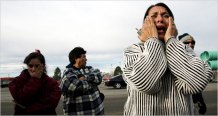
Bond Fund: First of all, full disclosure: Andrea is on our Steering Committee. Thank you Andrea, for all your time and expertise these last two years with the Bond Fund. Can you talk a little about your background?
Andrea Black: I’m the Network Coordinator at the Detention Watch Network. Prior to that I worked as an attorney at the Florence Immigrant and Refugee Rights Project in Arizona, which assists and represents immigrants detained in Arizona.
BF: What are your primary concerns about the new law in Arizona?
Andrea Black: It is tearing apart families, and it violates our Constitution and international human rights law. Clearly it increases the likelihood of arbitrary arrests and detention. Once a person is detained, the likelihood of finding an attorney plummets. Detained cases move quickly, and its very hard to gather witnesses, evidence, and put together a case.
BF: What is happening locally with immigration enforcement in Arizona?
Andrea Black: As a result of expanded ICE enforcement collaboration with local police, there is already a lot of immigration processing at local county jails. The new law puts more power in the hands of local police to ask for papers, make a determination, and immediately hand someone over to ICE for deportation. A person who can not show documents may be offered no options other than signing a stipulated order of removal, and getting on a bus to leave the country right then and there. People don’t know what they have signed, and attorneys can’t get there fast enough.
BF: Does Arizona have the capacity to detain all the people who could be arrested?

Click here to watch a video of Andrea Black
Andrea Black: No, the detention system in Arizona is already out of control, with ever-expanding bed space, poor conditions, and limited access to family and counsel that further isolates the detained person. The expansion of the prison system on the backs of immigrants is lining the pockets of private prison executives, and ultimately the community pays the cost.
BF: How isolated are these detention centers?
Andrea Black: The Eloy detention center, for example, is out in the desert, an hour and a quarter from Phoenix. Its very isolated, with limited visiting hours and no public transportation. Families who travel from Phoenix to visit loved ones in detention will pay $200 for a taxicab. When people are released, they are let out the door, with no way to get anywhere.
BF: Do you have hope for the future of immigration enforcement and policy?
Andrea Black: Communities are up in arms. People are educating themselves, asking questions of their elected officials, making demands to keep their communities and families safe. Here is the potential for reform. What can we do to support it? We can get the word out, share stories, and help people get out of detention for a fair hearing.
BF: Thank you Andrea, for your part in helping people come together to call for reform.
 For more information on the Arizona immigration law and how it will impact detention and deportation, check out DWN’s “Detention and Deportation Consequences of Arizona Immigration Law (SB 1070)”
For more information on the Arizona immigration law and how it will impact detention and deportation, check out DWN’s “Detention and Deportation Consequences of Arizona Immigration Law (SB 1070)”




 different from such rational assumptions.
different from such rational assumptions.

You must be logged in to post a comment.